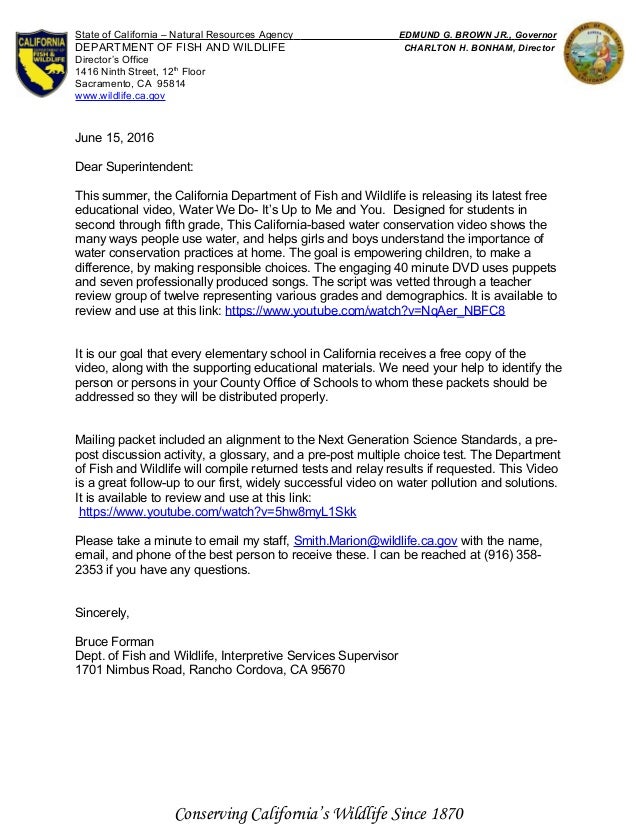Ever felt frustrated with the state of your child’s school? Worried about the curriculum, concerned about teacher shortages, or maybe just wanting a change in the school’s approach? You’re not alone. Many parents, teachers, and community members have concerns about the direction of education, and one powerful way to make your voice heard is through a letter to the superintendent of schools.

Image: www.pdffiller.com
The superintendent, as the head of the school district, plays a crucial role in shaping the educational landscape of your community. They oversee the budget, policies, hiring decisions, and the implementation of initiatives that impact students, teachers, and the entire school system. A well-written letter can bring your concerns directly to their attention, prompting them to consider your perspective and potentially leading to positive changes.
Understanding Your Audience: The Superintendent
Before you put pen to paper (or fingers to keyboard), it’s important to understand who you’re writing to. The superintendent is a busy individual, juggling countless responsibilities. Your letter needs to be concise, clear, and focused. It should demonstrate that you’ve taken the time to understand the school system’s challenges and offer constructive suggestions.
Building a Strong Foundation: Crafting Your Letter
Here are some crucial elements to consider when writing your letter to the superintendent:
1. Be Polite and Professional
Remember, your goal is to open a dialogue, not criticize or accuse. Start your letter with a respectful greeting, clearly stating your purpose, and outlining your relationship to the school system (e.g., parent, teacher, community member). For example:
“Dear Superintendent [Superintendent’s Last Name],”
“I am writing to you today as a concerned parent of a student attending [School Name].”

Image: www.slideshare.net
2. Keep it Focused and Specific
The superintendent has limited time, so avoid rambling or straying too far from your main point. Focus on a single issue or a related cluster of issues. For instance, rather than discussing a wide range of curriculum concerns, zero in on a specific subject area or a particular aspect of the curriculum’s impact on your child’s learning.
3. Provide Concrete Examples
Don’t just make general statements; back up your points with specific examples. This helps bring your concerns to life and creates a tangible representation of the issues you’re addressing. For example, if you’re concerned about a lack of resources for STEM education, describe a specific instance where your child’s learning was hindered due to inadequate materials or equipment.
4. Offer Constructive Solutions
While pointing out problems is important, the superintendent is more likely to respond positively if you also offer solutions. Have you researched best practices in other school districts? Do you have specific ideas for program additions or curriculum changes? Provide concrete suggestions that demonstrate your commitment to improving education in your community.
5. Be Realistic and Consider the System’s Constraints
The superintendent operates within a larger system of budgets, regulations, and policies. Be mindful of the constraints they face and avoid demanding unrealistic or impractical solutions. Your goal is to initiate a dialogue, and a constructive approach is more likely to yield positive results.
Addressing Common Concerns
Here are some common issues parents, teachers, and community members often raise in letters to the superintendent:
1. Curriculum and Instruction
Concerns about the curriculum’s relevance, depth, or alignment with college and career readiness standards are common. Are you concerned about insufficient focus on certain subject areas, a lack of emphasis on critical thinking skills, or an outdated approach to teaching? Clearly describe your concerns and offer specific suggestions for improvement, such as the inclusion of new learning technologies, more hands-on learning activities, or a greater emphasis on project-based learning.
2. School Resources and Funding
Many communities struggle with insufficient funding for schools, which can lead to a lack of resources in key areas like technology, library materials, classroom supplies, and extracurricular activities. Highlight the impact of these resource shortages on your children’s education and advocate for increased funding or more efficient resource allocation within the current budget.
3. Teacher Shortages and Retention
Teacher shortages are a nationwide problem, and they often lead to larger class sizes, limited course offerings, and difficulties filling important positions. Your letter could advocate for initiatives to attract and retain highly qualified teachers, such as competitive salaries, professional development opportunities, and a supportive work environment.
4. School Safety and Security
Safety is paramount in any school setting, and concerns about security measures, bullying, or a lack of mental health support services are often expressed to superintendents. Clearly articulate your concerns and suggest potential solutions to create a safer and more inclusive school environment.
5. Communication and Transparency
Concerns about a lack of transparency or effective communication from the school district are also common. Perhaps you’re seeking more detailed information about school policies, budget allocations, or student performance data. Express your desire for transparent and open communication channels and suggest ways the district can improve its outreach to parents and the community.
Writing a Powerful Letter
Here are some tips for crafting a letter that makes an impact:
- Use clear, concise language: Avoid jargon and technical terms that might not be readily understood by everyone.
- Proofread carefully: Errors in grammar and spelling can detract from the credibility of your message.
- Keep it brief: Aim for a letter that’s no more than one or two pages long.
- Include your contact information: Make it easy for the superintendent to reach you if they have questions or want to follow up.
- Follow up: Consider sending a follow-up email or making a phone call a few weeks after submitting your letter to inquire about the superintendent’s response.
Letter To The Superintendent Of Schools
Your Voice Matters
Writing a letter to the superintendent may seem like a small action, but it can be a powerful step towards creating positive change in your community’s educational landscape. Remember, your voice matters. Make it heard, and you might just inspire change for the better.






